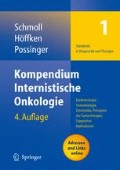Zusammenfassung
Verschiedene klinische Beobachtungen unterstützen die Vermutung, daß das Immunsystem bei der Bekämpfung von Tumorzellen eine wichtige Rolle spielt. Hierzu zählen
-
das sporadische Auftreten von spontanen Tumorremissionen im natürlichen Verlauf einer Tumorerkrankung,
-
die erhöhte Inzidenz von Malignomen unter intensiver immunsuppressiver Therapie,
-
die Wirksamkeit einer immunmodulatorischen Therapie mit IFN-α und IL-2 bei Patienten mit Melanom oder Nierenzellkarzinom sowie
-
der Graft-versus-Leukemia-Effekt durch Spenderlymphozyten-Infusionen nach allogener hämatopoietischer Stammzelltransplantation.
Access this chapter
Tax calculation will be finalised at checkout
Purchases are for personal use only
Preview
Unable to display preview. Download preview PDF.
Literatur
Brossart P, Wirths S, Stuhler G et al (2000) Induction of cytotoxic T-lymphocyte responses in vivo after vaccination with peptide-pulsed dendritic cells. Blood 96:3102–3108
Fong L, Hou Y, Rivas A et al (2001) Altered peptide ligand vaccinationwith Flt3 ligand expanded dendritic cells for tumor immunotherapy. Proc Natl Acad Sci USA 98:8809–8814
Heiser A, Coleman D, Dannull J et al (2002) Autologous dendritic cells transfected with prostate-specific antigen RNA stimulate CTL responses against metastatic prostate tumors. J Clin Invest 109:409–417
Herr W, Linn B, Leister N et al (1997) The use of computer-assisted video image analysis for the quantification of CD8+ T lymphocytes producing TNF-α spots in response to peptide antigens. J Immunol Methods 203:141–152
Jäger E, Ringhoffer M, Dienes HP et al (1996) GM-CSF enhances immune responses to melanoma-associated peptides in vivo. Int J Cancer 67:54–62
Jäger E, Gnjatic S, Nagata Y et al (2000) Induction of primary NY-ESO-1 immunity: CD8+ T lymphocyte and antibody responses in peptide-vaccinated patients with NY-ESO-1+ cancers. Proc Natl Acad Sci USA 97:12198–12203
Kuball J, Schuler M, Antunes Ferreira E et al (2002) Generating p53-specific cytotoxic T lymphocytes by recombinant adenoviral vector-based vaccination in mice, but not man. Gene Ther 9:833–843
Marchand M, van Baren N, Weynants P et al (1999) Tumor regressions observed in patients with metastatic melanoma treated with an antigenic peptide encoded by gene MAGE-3 and presented by HLA-A1. Int J Cancer 80:219–230
Meyer RG, Wölfel T. A phase I vaccination study with Tyrosinase in patients with stage II melanoma using recombinant modified vaccinia Ankara (MVA-hTyr) administered by three subcutaneous and intradermal injections. Manuskript in Vorbereitung
Renkvist N, Castelli C, Robbins PF et al (2001) A listing of human tumor antigens recognized by T cells. Cancer Immunol Immunother 50:3–15
Renner C, Kubuschok B, Trümper L et al (2001) Clinical approaches to vaccination in oncology. Ann Hematol 80:255–266
Rosenberg SA, Yang JC, Schwartzentruber DJ et al (1998) Immunologic and therapeutic evaluation of a synthetic peptide vaccine for the treatment of patients with metastatic melanoma. Nature Med 4:321–327
Thurner B, Haendle I, Röder C et al (1999) Vaccination with Mage-3A1 peptidepulsed mature, monocyte-derived dendritic cells expands specific cytotoxic T cells and induces regression of some metastases in advanced stage IV melanoma. J Exp Med 190:1669–1678
Timmerman JM, Czerwinski DK, Davis TA et al (2002) Idiotype-pulsed dendritic cell vaccination for B-cell lymphoma: clinical and immune responses in 35 patients. Blood 99:1517–1526
Titzer S, Christensen O, Manzke O et al (2000) Vaccination of multiple myeloma patients with idiotype-pulsed dendritic cells: immunological and clinical aspects. Br J Haematol 108:805–816
Van den Eynde BJ, van der Bruggen P (1997) T cell defined tumor antigens. Curr Opin Immunol 9:684–693
Yee C, Riddell SR, Greenberg PD (2001) In vivo tracking of tumor-specific T cells. Curr Opin Immunol 13:141–146
Editor information
Editors and Affiliations
Rights and permissions
Copyright information
© 2006 Springer Medizin Verlag Heidelberg
About this chapter
Cite this chapter
Herr, W., Huber, C. (2006). Tumorvakzine. In: Schmoll, HJ., Höffken, K., Possinger, K. (eds) Kompendium Internistische Onkologie. Springer, Berlin, Heidelberg. https://doi.org/10.1007/3-540-31303-6_43
Download citation
DOI: https://doi.org/10.1007/3-540-31303-6_43
Publisher Name: Springer, Berlin, Heidelberg
Print ISBN: 978-3-540-20657-6
Online ISBN: 978-3-540-31303-8
eBook Packages: Medicine (German Language)

